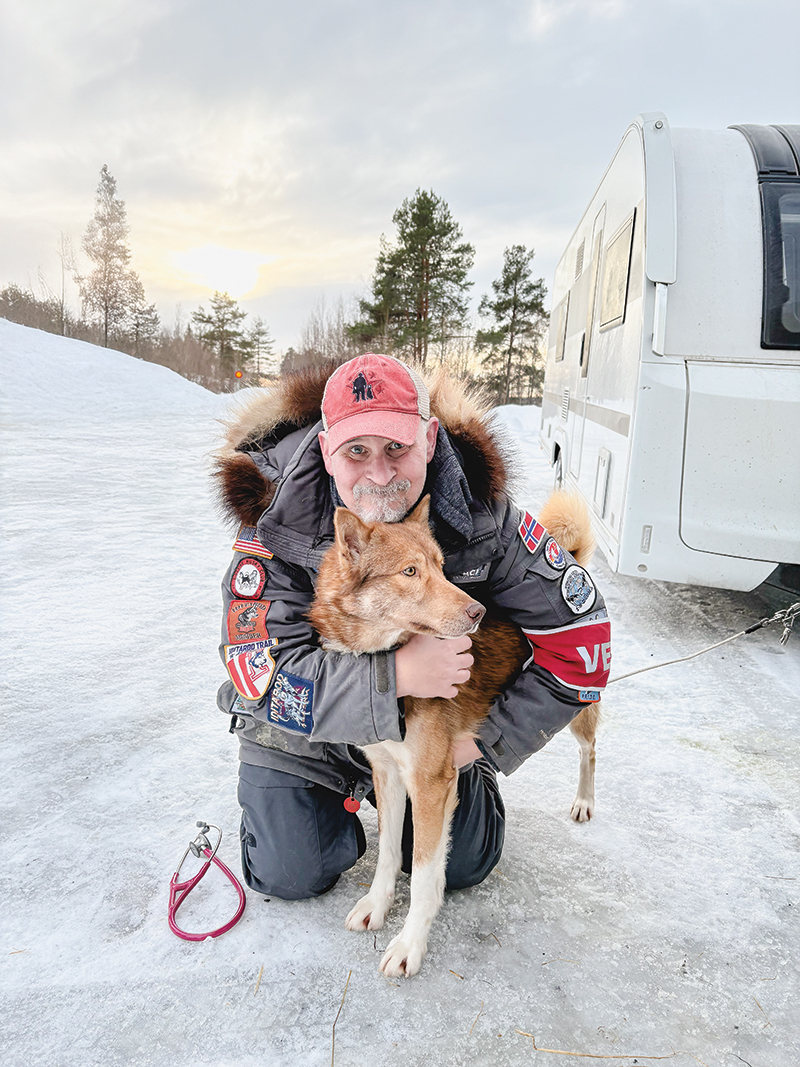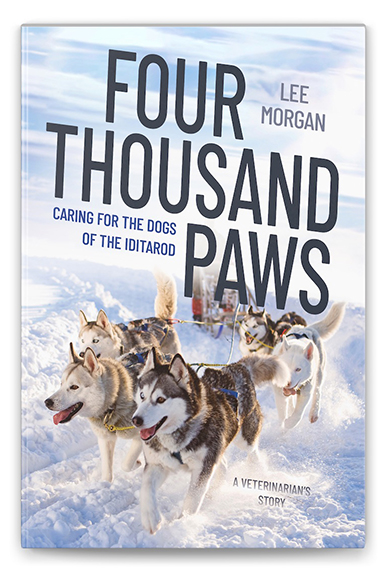connect
From Dolphins in Hawaii to Huskies in Alaska
An alumnus relished decades of adventures that began with Case Western Reserve University
 Photo courtesy of Lee MorganLee Morgan in Koyuk, Alaska, during the 2022 Iditarod. He loved connecting with dogs during the race's veterinary checkpoint.
Photo courtesy of Lee MorganLee Morgan in Koyuk, Alaska, during the 2022 Iditarod. He loved connecting with dogs during the race's veterinary checkpoint.
Lee Morgan, DVM (CWR '88), was going on two straight days without sleep.
Stationed in the small village of Shaktoolik, Alaska, along the Bering Sea, Morgan was volunteering his veterinarian expertise at a checkpoint for the 1,000-mile Iditarod Trail Sled Dog Race. Volunteers and mushers were packed into bunks in an old Alaska Army National Guard armory, and between dogs barking and the commotion of people coming and going, Morgan could not get any rest.
One afternoon, concerned that sleep deprivation would affect his ability to care for the dogs, he braved minus 30-degree Fahrenheit weather to try to set up a site to rest. But gale-force winds swept his equipment away.
At that moment, a local 8-year-old named Devon appeared and helped Morgan set up a temporary shelter, then, seemingly curious, watched over him as he slept. Rested and grateful, Morgan gifted the Inuit boy one of his most treasured possessions: a Swiss Army Knife his younger brother gave him decades earlier.
That serendipitous connection—moving in its kindness and simplicity—remains an indelible memory. "Meeting people from different cultures with their own customs is a really special part of the experience," Morgan said. "It broadens your worldview."

Morgan volunteered with the Iditarod for nine years and described his experiences with the dogs (roughly 1,000 annually), the terrain and the local residents in his 2024 memoir, Four Thousand Paws: Caring for the Dogs of the Iditarod (Liveright).
Working on the Iditarod was the most enduring in a series of thrilling experiences that Morgan dove into over decades—and it all began when he was a Case Western Reserve University student.
"I grew up in a small town in Ohio and, like a lot of kids, I wanted to be Indiana Jones—to have adventures, to be that guy," said Morgan, who owns and operates the Georgetown Veterinary Hospital in Washington, D.C. "I've had countless adventures in my career, and it truly is because of Case Western Reserve."
Morgan arrived on campus in 1983, recruited by legendary Coach Bill Sudek to run track. He was an enthusiastic student who worked hard to distinguish himself, even in his first year. With encouragement from faculty members in the Department of Biology, he secured a prestigious semester-long internship with the University of Hawaii at a marine mammal laboratory during his sophomore year. He spent hundreds of hours working with dolphins in a cognition study—and some stolen afternoons at the beach learning to surf.
"That internship set the stage for everything else I did in my life," Morgan said. "I went from being a normal guy to having this amazing opportunity, and it gave me the confidence to pursue more adventures."
During the ensuing decades, those adventures ranged from conducting research for NASA on a project developing an aquatic habitat for the International Space Station to performing lifesaving experimental surgery on a retired military dog.
Morgan first volunteered with the Iditarod in 2012. He didn't know what to expect but was quickly drawn into an atmosphere far different from the one evoked by the animal activists who deemed the race abusive.
"It really struck me just how friendly and happy these dogs are," he said. "They love to run, and they have an indescribable bond with their owners."
Keeping the dogs healthy and seeing their excitement as they prepared to rejoin the race after a veterinary checkpoint is what kept Morgan returning year after year.
"It's a powerful feeling to fix an animal," he said. "The creativity that goes into it—both in diagnosing the problem and then finding a way to treat it—is incredibly rewarding."





